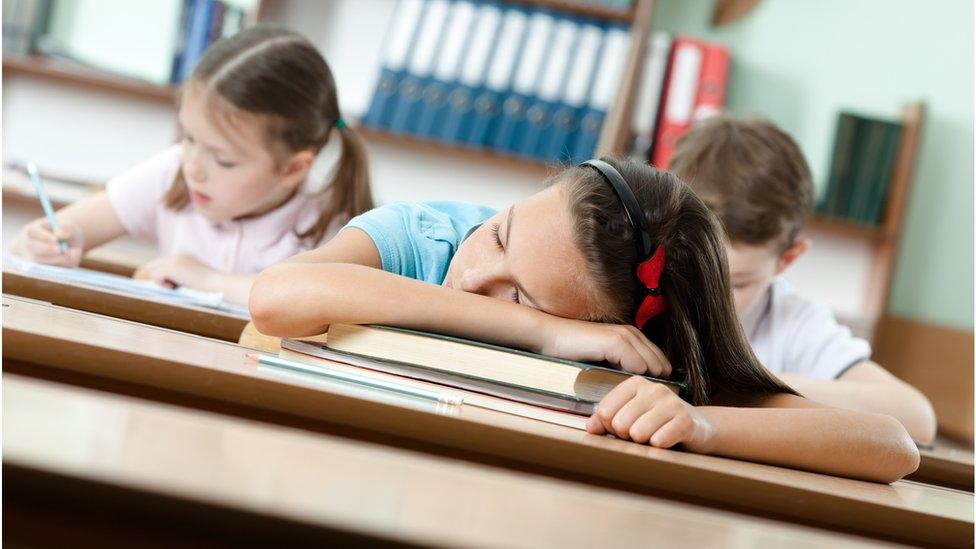School discipline: How strict is too strict?
- Published

Sarah Vincent changed her daughter's school when the rules suddenly got very strict
"Everyone will sit up extra straight, eyes front, looking at the teacher. You will follow their instructions first time, every time."
Pretty comfortable with that?
Parents may well agree that this excerpt from Great Yarmouth Charter Academy's school rules, external is no bad thing.
The rules also require pupils to read with a ruler and to wait for teacher's instructions before picking up a pen or anything else.
When they are not reading or writing they must sit up straight with their arms folded and they must "track the teacher" around the room.
"You never turn around - even if you hear a noise behind you. You don't look out of the window. You don't lose focus," the rules from new academy sponsors, Inspiration Trust, say.
Still reasonable?
Well, a group of parents did not think so and responded by contacting newspapers with claims children had wet themselves in class because they were not allowed to go to the toilet.
'Culture shock'
One upset parent, Sarah Vincent, said: "If we treated our children like that we would be reported to social services."
Her daughter, Summer, had become "withdrawn" and "miserable" after being repeatedly pulled up for uniform infringements, she said.
She was then given a demerit because she did not have her arms folded as per the school rules, Sarah added.
Others complained pupils were being isolated for as little as dropping a pencil, and parents of at least 16 children have applied to move them to other schools.
But the school, which the new academy trust is trying to turn around after it was rated inadequate, insists it is simply trying to enforce new, high standards of behaviour where they had been lacking.
Children were in school to learn, not look out of the window, a trust spokesman said.
"Setting out clear expectations means everyone knows what is expected and lessons start promptly and run efficiently, so that every pupil gets the most of their time in school."
Pupils had been getting out of their chairs and sometimes leaving classrooms and it was necessary now to enforce order, he said.
"It's very early days," he added.
"And there's been a culture shock from where the school was previously."
And some parents have been delighted with the change.

Parent Tanya McCormick said it had been "so far so good" for her daughter and that she thought parents might be "pleasantly surprised" by the effect of the new regime by the end of term.
But the case has certainly prompted parents, particularly those of children new to secondary school, to ask how strict is too strict.
David, an 11-year-old who has just started a very popular London boys' state school, describes all the things for which you can get a detention.
"For talking too loudly in the playground, for talking while you are lining up...
"You can get one if you don't take your bag off within five seconds of going inside, if you take more than 10 minutes to eat your lunch, or if you have a sweet wrapper in your pocket.
"It just feels like you're only really behaving because you are scared you will get a detention," he says.
'Dodged a bullet'
Christopher, a pupil at another successful boys' state school, says about 80% of the boys in his class had been given a detention in the first week.
He says his best friend crosses himself every time a detention is dished out in class, like he has "dodged a bullet".
But are these boys enjoying their new schools?
The answer's yes - they love them. But both think teachers should stop handing out quite so many detentions.
Jarlath O'Brien, director of schools with the Eden Academy Trust, says every September a slew of stories about parents horrified at the strictness of their new schools hits the headlines.
"No teacher would say 'we don't really care about bullying or the lessons being disrupted'," he says.
"My concern is when you have a set of rules which start to interfere with the flow of things."
Uniform 'obsession'
He gives the example of a school allowing short or long-sleeved shirts in its uniform, but not allowing rolled-up sleeves.
"A child might inadvertently roll his sleeves up, and then the lesson is disrupted because the teacher has to pick the child up on it."

Old school ties? Some schools specify how to tie them, as well as which to wear
There has been a tendency in recent times to equate smart uniform with high standards of behaviour, he says, but the two are not the same.
Being too strict can "smack of professional insecurity", he says, adding that this can backfire when "kids find themselves getting into bother without even trying".
The government's behaviour tsar Tom Bennett says people outside the UK "marvel at our obsession with school uniform".
He says the media pander to it by reporting examples of entire forms being sent home for wearing the wrong shoes or some such.
But it can used as a way of fostering a sense of belonging, he says, and letting pupils know: "This is the way we do things around here."
The best behaviour policies balance a culture of discipline with lots of pastoral support, he says.
"You need to have the compassion within the school structure.
"If you have that, if you have the love as well as the discipline, then things can really sky-rocket."
- Published14 September 2017

- Published20 September 2017

- Published24 March 2017
